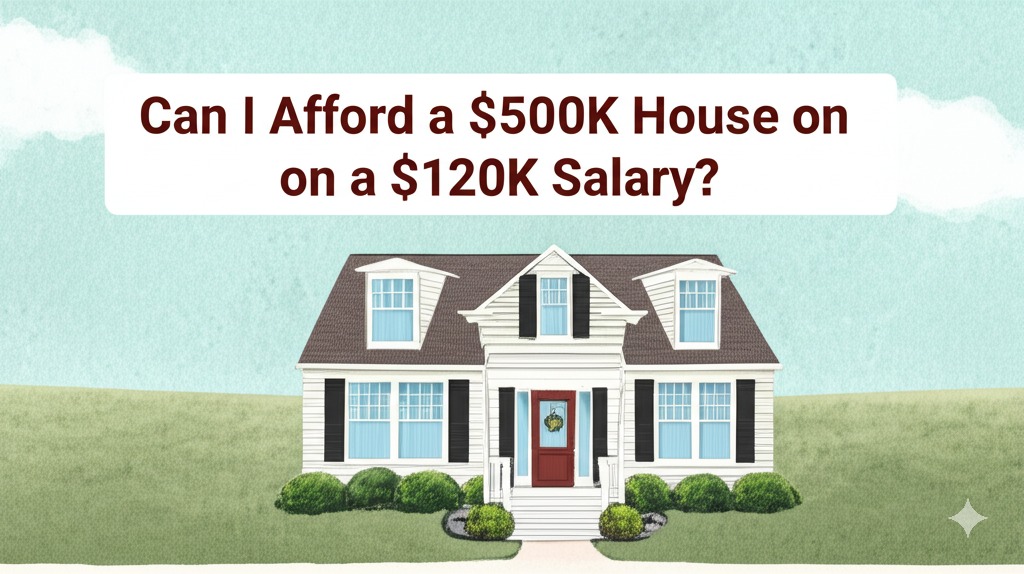
Buying a home is one of the most significant financial decisions most people will ever make. With skyrocketing real estate prices, many potential homeowners are left wondering if they can afford their dream house on their current income. If you’re asking yourself, “Can I afford a $500K house on a $120K salary?” you’re not alone. This is a common question that many first-time homebuyers ask when they start to explore the housing market. In this article, we’ll break down the key factors that will help you determine if purchasing a $500,000 home on a $120,000 salary is financially feasible.
What Does “Affording” a House Really Mean?
Before diving into the numbers, it’s important to understand what “affording” a house means. It’s not just about the price tag on the home; affordability is determined by how much you can comfortably pay each month for your mortgage, taxes, insurance, and maintenance costs. To determine if a $500K house is within your reach on a $120K salary, you’ll need to consider several factors, including:
- Your monthly mortgage payment.
- Down payment and closing costs.
- Other monthly debt obligations (e.g., student loans, car payments).
- Property taxes, insurance, and maintenance costs.
By evaluating these components, you can determine if buying a home in this price range makes sense for your financial situation.
Breaking Down the Numbers: Monthly Mortgage on a $500K Home
One of the first questions you’ll likely ask is how much your monthly mortgage payment will be for a $500,000 house. The amount of your monthly payment depends on several factors, including:
- Down payment: Typically, a 20% down payment is standard, though you may be able to qualify for a mortgage with a lower down payment.
- Interest rate: Your mortgage rate will depend on your credit score, market conditions, and the type of loan you secure.
- Loan term: Most mortgages are either 30-year or 15-year loans, with 30 years being the most common.
Let’s assume the following:
- A 20% down payment ($100,000) on a $500K home.
- A 30-year mortgage with an interest rate of 6% (this can vary based on market conditions).
- No other significant debt.
Using these assumptions, your monthly mortgage payment would be approximately $2,400 (principal and interest only). However, this is just the start.
Additional Costs to Consider
Beyond your mortgage, there are several other costs to consider when owning a home:
- Property Taxes: Property taxes vary by location, but they typically range between 1% and 2% of the property value annually. For a $500K home, that’s roughly $5,000–$10,000 per year ($417–$833 per month).
- Homeowners Insurance: On average, homeowners insurance costs around $1,000–$2,000 per year for a $500K home, which breaks down to about $83–$167 per month.
- Private Mortgage Insurance (PMI): If your down payment is less than 20%, you’ll likely need to pay for PMI. This can add an additional $100–$300 to your monthly payments.
- Maintenance and Repairs: Homeownership comes with ongoing costs for maintenance and repairs. A general rule of thumb is to budget 1% of the home’s value per year for maintenance. For a $500K home, that’s about $5,000 annually or $417 per month.
When you factor in all these additional costs, your total monthly payment could rise to $3,317–$4,000 per month. This is a significant amount to manage, especially when you’re living on a salary of $120,000 per year.
Is a $500K Home Affordable on a $120K Salary?
Now that you have a clearer picture of what the monthly costs would look like, the next question is whether you can afford these payments on a $120,000 salary. The general rule of thumb is that your monthly housing expenses should not exceed 28% to 30% of your gross monthly income. Let’s calculate this:
- A $120K salary translates to about $10,000 per month in gross income.
- 30% of $10,000 is $3,000.
In this scenario, your monthly housing expenses (mortgage, taxes, insurance, maintenance, etc.) would exceed the 30% threshold, coming in at around $3,317–$4,000. This could make the purchase of a $500K home financially challenging, especially if you have other debts or financial obligations.
Alternatives and Solutions
If you’re determined to buy a home and a $500K property feels out of reach, here are a few strategies to consider:
1. Increase Your Down Payment
A larger down payment will reduce the size of your mortgage, lowering your monthly payment. For example, if you could put down 30% instead of 20%, you’d only need to finance $350,000 instead of $400,000, significantly reducing your mortgage costs.
2. Consider a Smaller Home
If you’re open to scaling back, consider purchasing a more affordable home. While it might not be your dream home, a smaller or less expensive property could make homeownership more feasible.
3. Explore Lower Interest Rates or Different Loan Options
If you have a strong credit score, you might qualify for a lower interest rate. Additionally, exploring government-backed loans like FHA or VA loans may help you secure a more affordable mortgage with a lower down payment requirement.
4. Reduce Other Debt
Before buying a home, paying down existing debts (e.g., car loans, student loans) can help improve your debt-to-income ratio, making it easier to qualify for a mortgage.
Conclusion: Is It Possible?
Can you afford a $500K house on a $120K salary? In many cases, the answer is yes, but with caution. It’s essential to evaluate your entire financial picture before making such a large purchase. If your monthly housing expenses exceed 30% of your income, it could strain your budget and make it more difficult to save or invest in other areas of your life. However, by adjusting factors like your down payment, considering smaller homes, or exploring different loan options, it’s possible to make homeownership more affordable.
If you’re serious about buying a home, consult with a financial advisor and a mortgage lender to create a strategy that aligns with your goals. The key is to ensure that your new home doesn’t become a financial burden, but rather a smart investment in your future.

Andre Cuevas provides career insights, job search strategies, and professional advice to help individuals navigate the job market and achieve their career goals.




